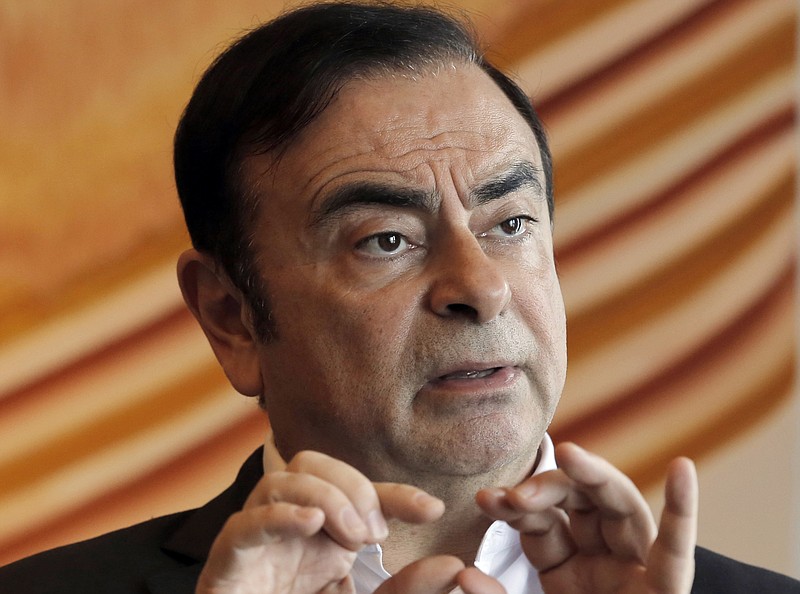Carlos Ghosn, the man who created what was effectively the world's largest carmaker, has been released on bail after spending more than three months in jail.
Ghosn once oversaw the alliance of Nissan, Renault and Mitsubishi and was the consummate high-flying executive. On Wednesday, he walked out of a Japanese detention center disguised as a construction worker to prepare for a trial on charges of financial misconduct. Under the terms of his bail - set at 1 billion yen, or almost $9 million - he cannot leave Japan.
Here is what has happened since his arrest and what he faces now.
Why was he arrested?
Ghosn has been accused of underreporting his compensation and shifting more than $16 million of personal losses to Nissan. He was in jail, questioned by prosecutors, for 108 days.
His close aide, Greg Kelly, was arrested the same day, Nov. 19, in connection with underreporting Ghosn's income. Kelly was granted bail on Christmas Day because of ill health.
Both men deny the charges against them.
Why was he held for so long?
Ghosn is wealthy and has no family in Japan. A citizen of Brazil, France and Lebanon, he was viewed as a flight risk. (Brazil and Lebanon do not extradite their own citizens.)
Prosecutors were able to question him for weeks without charging him. They were also able to extend his detention through routine court requests. Under Japanese law, Ghosn was questioned with no lawyer at his side.
He was denied bail twice in January, despite promising to surrender his passports and pay for a tracking device and security guards.
Ghosn had his third bail hearing on Tuesday.
His detention has led to scrutiny of the power that prosecutors wield in the Japanese criminal justice system. The case has shone a light on due process in Japan, particularly for foreigners working there.
What has happened at Nissan and Renault?
Nissan and Mitsubishi, the two Japanese partners in an alliance with Renault, dismissed Ghosn as chairman soon after his arrest. Ghosn resigned as Renault's chairman and chief executive in January.
He remains on the boards of all three companies.
Ghosn blamed his arrest on "plot and treason" by executives at Nissan. He had pushed for more cost savings and sharing of engineering and design work between Nissan and Renault. But some at Nissan were concerned that he was pushing for a merger.
Renault initially stood by Ghosn. But it is now investigating if Ghosn may have misused company money in 2016 to finance a lavish Marie Antoinette-themed party at the Palace of Versailles to celebrate his second marriage and his new wife's birthday. The board has voted unanimously to cancel tens of millions of euros in compensation that he was set to receive as its chairman and chief executive.
A rift opened up between Nissan and Renault after the arrest, with each company viewing the other as trying to seize the opportunity to tip the balance of power in the alliance.
Renault and the French government, Renault's largest shareholder, have been concerned that Nissan may seek to change the companies' shareholding structure. Renault owns a 43 percent stake in Nissan; Nissan holds a 15 percent share in Renault that does not carry voting rights.
Renault and Nissan have also been conducting a joint inquiry into a Dutch corporate entity, which Japanese authorities have said Ghosn used to finance benefits for himself, including several corporate homes.
What happens next?
As part of the bail agreement, Ghosn must give his passports to his lawyers, remain in Tokyo, and not have contact with others involved in the case, according to Japanese news media. He will be monitored by security cameras at home and have limited use of phones and computers, the reports said.
He faces steep odds in trial: Japanese prosecutors have a 99 percent conviction rate of indicted defendants. But the case is under intense scrutiny and his legal team has managed the relatively rare feat in Japan of getting him released before trial.
But there are also issues for Nissan in this legal battle. The company too has been indicted on charges of improperly reporting Ghosn's income - and it has promised to review its corporate governance standards. It has said it is cooperating with prosecutors.
Ghosn's lawyer, Junichiro Hironaka, has indicated that part of his legal strategy will be to ask: What did Nissan know and when did it know it?
